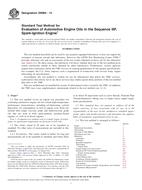Potrebujeme váš súhlas na využitie jednotlivých dát, aby sa vám okrem iného mohli ukazovať informácie týkajúce sa vašich záujmov. Súhlas udelíte kliknutím na tlačidlo „OK“.
ASTM D6984-14
Standard Test Method for Evaluation of Automotive Engine Oils in the Sequence IIIF, Spark-Ignition Engine
Automaticky preložený názov:
Štandardná skúšobná metóda pre hodnotenie olejov Automotive motora v poradí IIIF , zážihového motora
NORMA vydaná dňa 1.5.2014
Informácie o norme:
Označenie normy: ASTM D6984-14
Poznámka: NEPLATNÁ
Dátum vydania normy: 1.5.2014
Kód tovaru: NS-37212
Počet strán: 52
Približná hmotnosť: 156 g (0.34 libier)
Krajina: Americká technická norma
Kategória: Technické normy ASTM
Anotácia textu normy ASTM D6984-14 :
Keywords:
cam and lifter wear, deposits, engine oil, engine wear, high-temperature performance, oil consumption, oil thickening, oil viscosity, oxidation resistance, Sequence IIIF test, spark-ignition automotive engine, varnish, varnish deposition, ICS Number Code 75.100 (Lubricants, industrial oils and related products)
Doplňujúce informácie
| Significance and Use | ||||||||||||||||||||||||||||||||||||||||||||||||||||||||||||||||||||||||||||
|
5.1 This test method was developed to evaluate automotive engine oils for protection against oil thickening and engine wear during moderately high-speed, high-temperature service. 5.2 The increase in oil viscosity obtained in this test method indicates the tendency of an oil to thicken because of oxidation. In automotive service, such thickening can cause oil pump starvation and resultant catastrophic engine failures. 5.3 The deposit ratings for an oil indicate the tendency for the formation of deposits throughout the engine, including those that can cause sticking of the piston rings in their grooves. This can be involved in the loss of compression pressures in the engine. 5.4 The camshaft and lifter wear values obtained in this test method provide a measure of the anti-wear quality of an oil under conditions of high unit pressure mechanical contact. 5.5 The test method was developed to correlate with oils of known good and poor protection against oil thickening and engine wear. Specially formulated oils that produce less than desirable results with unleaded fuels were also used during the development of this test method. 5.6 The Sequence IIIF engine oil test has replaced the Sequence IIIE test and can be used in specifications and classifications of engine lubricating oils, such as: 5.6.1 Specification D4485, 5.6.2 Military Specification MIL-PRF-2104, and 5.6.3 SAE Classification J183. |
||||||||||||||||||||||||||||||||||||||||||||||||||||||||||||||||||||||||||||
| 1. Scope | ||||||||||||||||||||||||||||||||||||||||||||||||||||||||||||||||||||||||||||
|
1.1 This test method covers an engine test procedure for evaluating automotive engine oils for certain high-temperature performance characteristics, including oil thickening, varnish deposition, oil consumption, as well as engine wear. Such oils include both single viscosity grade and multiviscosity grade oils that are used in both spark-ignition, gasoline-fueled engines, as well as in diesel engines. 1.2 The values stated in SI units
are to be regarded as standard. No other units of measurement are
included in this standard.
1.2.1 Exceptions—The values stated in inches for ring gap measurements are to be regarded as standard, and where there is no direct SI equivalent such as screw threads, National Pipe Threads/diameters, tubing size, or single source supply equipment specifications. 1.3 This standard does not purport to address all of the safety concerns, if any, associated with its use. It is the responsibility of the user of this standard to establish appropriate safety and health practices and determine the applicability of regulatory requirements prior to use. |
||||||||||||||||||||||||||||||||||||||||||||||||||||||||||||||||||||||||||||
| 2. Referenced Documents | ||||||||||||||||||||||||||||||||||||||||||||||||||||||||||||||||||||||||||||
|
Odporúčame:
Aktualizácia technických noriem
Chcete mať istotu, že používate len platné technické normy?
Ponúkame Vám riešenie, ktoré Vám zaistí mesačný prehľad o aktuálnosti noriem, ktoré používate.
Chcete vedieť viac informácií ? Pozrite sa na túto stránku.




 Cookies
Cookies
